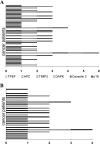Hypermethylation of the TPEF/HPP1 gene in primary and metastatic colorectal cancers
- PMID: 16207479
- PMCID: PMC1501884
- DOI: 10.1593/neo.05235
Hypermethylation of the TPEF/HPP1 gene in primary and metastatic colorectal cancers
Abstract
The role of promoter methylation in the process of cancer cell metastasis has, however, not yet been studied. Recently, methylation of the TPEF (transmembrane protein containing epidermal growth factor and follistatin domain) gene was reported in human colon, gastric, and bladder cancer cells. Using the Methylight assay, TPEF/HPP1 gene methylation was assessed in primary colorectal cancers (n = 47), matched normal colon mucosa, as well as in the liver metastasis of 24 patients with colorectal cancer, and compared to the methylation status of the TIMP-3, APC, DAPK, caveolin-2, and p16 genes. TPEF was frequently methylated in primary colorectal cancers (36 of 47) compared to the normal colon mucosa (1 of 21) (P < .0001), and TPEF mRNA expression in colon cancer cell lines was restored after treatment with 5-aza-2'-deoxycytidine. The p16 and APC genes were also frequently methylated in primary colorectal cancers (P < .02) compared to the normal colon mucosa. Interestingly, promoter methylation was significantly more frequent in proximal, nonrectal cancers (P < .05). Furthermore, a high degree of methylation of the TPEF gene was also observed in liver metastasis (19 of 24). In summary, we observed frequent TPEF methylation in primary colorectal cancers and liver metastases, indicating that epigenetic alterations are not only present in the early phases of carcinogenesis, but are also common in metastatic lesions. The high frequency of TPEF methylation in this series of colorectal cancers underscores the importance of epigenetic changes as targets for the development of molecular tests for cancer diagnosis.
Figures




References
-
- Greenlee RT, Murray T, Bolden S, Wingo PA. Cancer statistics, 2000. CA Cancer J Clin. 2000;50:7–33. - PubMed
-
- Chung DC. The genetic basis of colorectal cancer: insights into critical pathways of tumorigenesis. Gastroenterology. 2000;119:854–865. - PubMed
-
- Nelson H, Petrelli N, Carlin A, Couture J, Fleshman J, Guillem J, Miedema B, Ota D, Sargent D. Guidelines 2000 for colon and rectal cancer surgery. J Natl Cancer Inst. 2001;93:583–596. - PubMed
-
- Zink S, Kayser G, Gabius HJ, Kayser K. Survival, disease-free interval, and associated tumor features in patients with colon/rectal carcinomas and their resected intra-pulmonary metastases. Eur J Cardiothorac Surg. 2001;19:908–913. - PubMed
-
- Sparks AB, Morin PJ, Vogelstein B, Kinzler KW. Mutational analysis of the APC/beta-catenin/Tcf pathway in colorectal cancer. Cancer Res. 1998;58:1130–1134. - PubMed
Publication types
MeSH terms
Substances
LinkOut - more resources
Full Text Sources
Other Literature Sources
Medical
Research Materials
Miscellaneous
